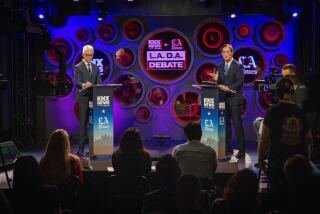CALIFORNIA ELECTIONS / U.S. SENATE : Ideologies Clash in First Herschensohn, Campbell Debate : Politics: The two find little common ground, attacking each other on taxes, the defense budget and the deficit.
IRVINE — Republicans Tom Campbell and Bruce Herschensohn clashed sharply on virtually every issue they discussed Monday in a debate between U.S. Senate candidates that previewed the sort of moderate-conservative divisions that will mark their primary campaigns.
Herschensohn, 59, the conservative Los Angeles radio and television commentator, was the early aggressor, using his full four-minute opening statement in an attempt to characterize Campbell as nothing more than a Democratic liberal.
Campbell, 39, the moderate two-term congressman from Palo Alto who calls himself a “new conservative,” responded in kind during the 90-minute joint appearance before the Lincoln Club of Orange County at the Hyatt Regency Irvine hotel. Campbell devoted much of his closing statement to a counterattack on Herschensohn’s positions, particularly on the economy.
Herschensohn began by turning directly to Campbell and saying: “I am going to run against you as I would against any liberal Democrat because, on so many of the issues, you go to their side rather than to the side of those things in which Republicans so strongly believe.”
At the end, Campbell said implementing Herschensohn’s economic proposals, including a flat-rate income tax and elimination of the home mortgage interest deduction, would lead the nation from recession into depression. Meeting with reporters afterward, Campbell called Herschensohn’s economic plan “dangerous,” a word he repeated for emphasis.
In their news conferences, both candidates said they were happy with the way the exchange went and said they had managed to disagree without being disagreeable. They are scheduled to meet again in San Diego in December in a session that is to include Palm Springs Mayor Sonny Bono. Bono, who also is seeking the U.S. Senate seat held by Democrat Alan Cranston, sent word that he could not attend Monday because of a head cold.
However, Herschensohn and Campbell were joined by another candidate, Corona Mayor Pro Tem Bill Franklin, a retired Anaheim police captain. Franklin, who identified himself as a Dwight D. Eisenhower middle-of-the-road Republican, was positioned at his rostrum on stage between Campbell and Herschensohn. They mostly exchanged political darts as if Franklin were not there.
Campbell planned to stay in Orange County through Monday night, to appear at a $1,000-per-person fund-raising dinner to benefit his campaign at the Coto de Caza home of developer William Lyon. The featured speaker for the evening was George Shultz, the secretary of state in the Reagan Administration and one of Campbell’s chief Northern California supporters.
The Lincoln Club, an organization of prominent Orange County business people, also is attempting to organize a meeting between Sen. John Seymour and Rep. William E. Dannemeyer of Fullerton, who are vying for the Republican nomination in the primary next June for California’s other Senate seat. Gov. Pete Wilson appointed Seymour, a moderate state senator, to the post Wilson relinquished in order to take office as governor. The election will be for the final two years of Wilson’s term.
Not since California entered the Union in 1850 have both Senate seats been up for election at the same time.
Monday’s Herschensohn-Campbell exchange moved the 1992 campaign out of the preliminary posturing stage and into a direct exchange of philosophies. Actually, there will be no official candidates until filing for office opens in February. But most observers believe that the fields for the two Senate seats are set, in terms of major candidates.
In opening, Campbell stressed his record on economics and contrasted it with that of Herschensohn, who has never held political office but has been a commentator for KABC radio and television over the past 13 years. Campbell said he supports reinstatement of the Gramm-Rudman deficit-reduction law. Herschensohn said Gramm-Rudman is useless as a means of holding down spending.
In his summation, Campbell said: “I think the most important message we can send is: Who you nominate in June ought to be electable in November. And you’re not going to elect somebody in November who has called Social Security Socialist Security, who has called for maximum drilling off the coast of California and all of the other issues that you know my colleague has proposed.”
Herschensohn said in his closing: “I think the only way you can judge a candidate’s vision of the future is to look at those things he’s said in the past.
“I said the Soviet Union would crumble if we stopped propping it up. I said that Deng Xiaoping was a tyrant 13 years before Tian An Men Square. . . . I was laughed at when I said the Corazon Aquino government is not going to be good for the United States--that we’re going to lose Clark Air Force Base and Subic Naval Base (in the Philippines).”
While Campbell has proposed cutting the defense budget in the absence of a massive Soviet military threat, Herschensohn said: “Above all, I would like to make the defense of this country so strong that the next generation doesn’t even think of going to war.”
They did agree on two issues: opposition to capping interest rates on credit card debt and support for a voucher system that would allow parents to use state funds to send children to private schools.
While they differed on congressional term limits--with Campbell supporting them--Herschensohn volunteered to stay in the Senate for only two terms if elected. He decided to do that on the spur of the moment in order to remove term limits as a issue in the campaign, Herschensohn said.
More to Read
Get the L.A. Times Politics newsletter
Deeply reported insights into legislation, politics and policy from Sacramento, Washington and beyond. In your inbox three times per week.
You may occasionally receive promotional content from the Los Angeles Times.










